| 28 December |
• yesterday • tomorrow |
| Feast of the Holy Innocents |
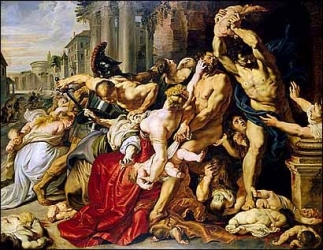
• Childermas
• Children's Mass
• 28 December (Roman Catholic; Church of England; Lutheran Church)
• 27 December (Syriac Orthodox Church; Syro-Malankara Catholic Church; Maronite Church; Chaldeans; Syro-Malabar Catholic Church)
• 29 December (Eastern Orthodox Church)
The children slaughtered by Herod the Great when he tried to kill the infant Christ.
When Herod realized that he had been deceived by the magi, he became furious. He ordered the massacre of all the boys in Bethlehem and its vicinity two years old and under, in accordance with the time he had ascertained from the magi. Then was fulfilled what had been said through Jeremiah the prophet: "A voice was heard in Ramah, sobbing and loud lamentation; Rachel weeping for her children, and she would not be consoled, since they were no more." - Matthew 2:16-18
• against ambition
• against jealousy
• altar servers
• babies
• children
• children's choir
• choir boys
• foundlings
• students, school children
A tiny child is born, who is a great king. Wise men are led to him from afar. They come to adore one who lies in a manger and yet reigns in heaven and on earth. When they tell of one who is born a king, Herod is disturbed. To save his kingdom he resolves to kill him, though if he would have faith in the child, he himself would reign in peace in this life and for ever in the life to come.
Why are you afraid, Herod, when you hear of the birth of a king? He does not come to drive you out, but to conquer the devil. But because you do not understand this you are disturbed and in a rage. To destroy one child whom you seek, you show your cruelty in the death of so many children.
You are not restrained by the love of weeping mothers and fathers mourning the deaths of their sons, nor by the cries and sobs of the children. You destroy those who are tiny in body because fear is destroying your heart. You imagine that if you accomplish your desire you can prolong you own life, though you are seeking to kill Life himself.
The children die for Christ, though they do not know it. The parents mourn for the death of martyrs. The Christ child makes of those as yet unable to speak fit witnesses to himself. But you, Herod, do not know this and are disturbed and furious. While you vent your fury against the child, you are already paying him homage, and do not know it.
To what merits of their own do the children owe this kind of victory? They cannot speak, yet they bear witness to Christ. They cannot use their limbs to engage in battle, yet already they bear off the palm of victory. - from a sermon by bishop Saint Quodvultdeus about the Holy Innocents
https://catholicsaints.info/holy-innocents/
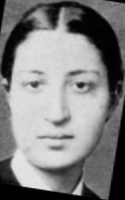
Katarina Volpicelli
Born into an upper middle-class family, Caterina was well educated at the Royal Educational Institute of San Marcellino. Initially concerned with making a name for herself in society, in her teens Caterina felt drawn more and more to the spiritual life. Friend and spiritual student of Blessed Ludovico of Casoria, who led her to become a Franciscan tertiary. On 28 May 1859 Caterina joined the Perpetual Adorers of the Blessed Sacrament, but developed serious health problems and left. Member of the Apostleship of Prayer. Founded the Institute of Handmaidens of the Sacred Heart on 1 July 1874, which received the approval of Pope Leo XIII on 13 June 1890. She opened the orphanage of the Margherites, founded a lending library, and with the help of Venerable Rosa Carafa Traetto, she set up the Association of the Daughters of Mary.
21 January 1839 in Naples, Italy
28 December 1894 in Naples, Italy of natural causes
26 April 2009 by Pope Benedict XVI
She also knew how to draw from the Eucharist that missionary zeal that led her to express her vocation in the Church, submitting with docility to pastors, and [being] prophetically oriented to the promotion of the laity and new forms of consecrated life. Although not establishing operational centers or giving life to specific institutions, as she herself stated, she wanted to find solitude in activity, and fruitful work in solitude. - Pope John Paul II at the beatification of Saint Caterina
https://catholicsaints.info/saint-caterina-volpicelli/
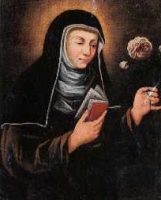
• Mattia
• Matthias Nazarei
Born to the nobility, the only child of Count Gualtiero Nazarei and his wife Sibilla, from her youth Matthia preferred a simple life and rejected all the pomp of court life. When her father threatened her with an arranged marriage, she fled to the convent of Santa Maddalena at Metalica, Italy and became a Benedictine nun. Served as abbess of the house for 40 years. The convent later adopted the rule of the Poor Clares, and so Matthia is often listed as a Poor Clare. In 1758 the house was re-named Beata Matthias in her honour.
1 March 1253 in Matelica, Macerata, Italy
• 28 December 1319 in Matelica, Macerata, Italy of natural causes
• re-interred near the high altar of her convent chapel
• body moved in 1536, found incorrupt and sweating
• body moved in 1756 in order to repair the chapel, and found incorrupt
27 July 1765 by Pope Clement XIII (cultus confirmed)
https://catholicsaints.info/blessed-matthia-dei-nazzarei/
• Antony of Lérins
• Anthony the Hermit
Anthony's father died when the boy was eight years old, and he was raised for several years by Saint Severinus of Noricum. Severinus, however, died when the boy was in his early teens, and Antony moved in with his uncle, Bishop Constantius of Lorsch, Bavaria (in modern Germany. When he was of age, Anthony became a monk. Hermit in the area of Lake Como, Italy. He and some other solitaries gained such a reputation for sanctity that they attracted would-be students. Anthony, wanting to live the life of a hermit moved to the Isle of Lerins, France where he lived his last two years. Known as a miracle worker. Saint Ennodius of Pavia wrote a Life of Saint Antony.
c.468 at Valeria, Lower Pannonia (in modern Hungary)
c.520 at Lerins, Provence, France of natural causes
https://catholicsaints.info/saint-anthony-of-lerins/
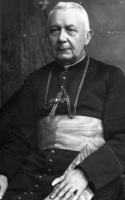
Gregor, Gregory, Grzegorz, Hryhorij, Hryhory
27 June as one of the Martyrs Killed Under Communist Regimes in Eastern Europe
Greek Catholic. Ordained on 18 November 1893. Studied theology at Vienna, Austria from 1894 to 1899. Rector of the seminary in Lviv, Ukraine in 1902. Bishop of Stanislaviv (modern Ivano-Frankivsk), Ukraine on 6 May 1904. Arrested for his faith in 1939 by the NKVD. Arrested again in April 1945; deported to Kiev, Ukraine. Died in prison. Martyr.
25 March 1867 at Hadynkivtsi, Ternopil District, Ukraine
17 January 1947 in NKVD prison in Kiev, Ukraine
27 June 2001 by Pope John Paul II in Ukraine
https://catholicsaints.info/blessed-hryhorii-khomyshyn/
Member of the Premonstratensians. Canon of the monastery in Obermarchtal, Swabia (in modern Germany); spiritual student of Blessed Ulkirk. Abbot of the house in 1591. His dedication to the discipline and rule of the Order led to his appointment as visitor in the region, responsible for checking on other houses and helping their dedication. Late in life he received a vision of Blessed Ulkirk.
16th century Germany
1600 of natural causes
https://catholicsaints.info/blessed-johannes-riedgasser/
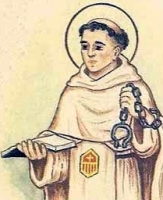
Gregorio da Cahors
Mercedarian. Master of Sacred Theology. Assigned in 1462 to ransom Christians enslaved by Muslims in Africa, the brought 184 of them home. Retired to live as a monk at the convent of Santa Maria in Toulouse, France where he devoted himself to prayer and contemplation.
France
https://catholicsaints.info/blessed-gregory-of-cahors/
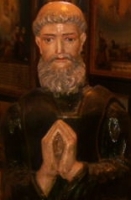
Brother of Blessed Herman of Heidelberg. Benedictine monk and priest at the monastery of Niederaltaich, Bavaria (modern Germany). After his brother's death, Otto exercised his vocation from Herman's old cell.
1344
https://catholicsaints.info/blessed-otto-of-heidelberg/
Caesarius led a dissolute and sinful life for years. Father of the Arian heretic Eudoxius. In the end, however, Caesarius became a serious Christian, stayed with the orthodox faith, and was martyred under Galerius Maximian.
burned to death at the stake in 309 at Arabissus, Armenia
https://catholicsaints.info/saint-caesarius-of-armenia/
Less than 20 years old when she was arrested for aiding Christian prisoners during the persecutions of Marcus Aurelius. The judge offered her clemency in return for sexual favours; she declined. She was beaten, thrown to wild animals and executed for her faith. Martyr.
beheaded in 169 in Rome, Italy
https://catholicsaints.info/saint-iolande-of-rome/
Cofen, Govan, Goven
Queen, the wife of King Tewdrig of Glamorgan, an area of modern Wales. The parish of Llangoven, Monmouthshire, and a chapel in Pembrokeshire are named for her.
5th century Wales
https://catholicsaints.info/saint-gowan-of-wales/
Teona, Theon
Teacher at Origen's school of theology in Alexandria, Egypt. Priest. Bishop of Alexandria in 282.
28 December 300 of natural causes
https://catholicsaints.info/saint-theonas-of-alexandria/
A young man born to the nobility who publicly proclaimed his Christianity. Martyred in the persecutions of Decius.
crucified c.250 in Neo-Caesarea, Pontus (in modern Turkey)
https://catholicsaints.info/saint-troadius-of-pontus/
Fourth century priest in Rome, Italy. He collected old texts which were used by Saint Jerome. Both Saint Jerome and Saint Augustine wrote glowingly of Domnio and his ministry in Rome.
https://catholicsaints.info/saint-domnio-of-rome/
Augustinian canon. Evangelized along the eastern shore of the Caspian sea in the 17th century. Martyred for loyalty to the Vatican.
Astrakhan, Russia
https://catholicsaints.info/blessed-nicholas-mello/
Converted by Saint Patrick. Ordained as priest and bishop by Patrick, and sent by him to evangelize the Isle of Man.
c.450 of natural causes
https://catholicsaints.info/saint-conindrus/
Thirteenth-century monk and founder of the Simonos-Petras monastery on Mount Athos during the time of the Crusades.
https://catholicsaints.info/saint-simon-the-myroblite/
Converted by Saint Patrick. Ordained as priest and bishop by Patrick, and sent by him to evangelize the Isle of Man.
c.450 of natural causes
https://catholicsaints.info/saint-romulus/
Poor Clare nun in Brixon, Italy.
1643 of natural causes
https://catholicsaints.info/blessed-claudia-weinhardt/
Deacon. Martyr.
Ankara, Galatia (modern Turkey)
https://catholicsaints.info/saint-domitian-the-deacon/
Priest. Martyr.
at Ankara, Galatia (modern Turkey)
https://catholicsaints.info/saint-eutychius/
Three Christians murdered together in Africa for their faith. The only details to survive are their names - Castor, Rogatian and Victor.
https://catholicsaints.info/martyrs-of-africa-28-december/
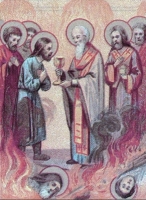
20,000 Christians who were murdered during in 303 in Nicomedia, Bithynia (modern Izmit, Turkey) during the persecutions of Diocletian. Many of them were killed en masse when they were ordered, during Christmas Mass, to sacrifice to idols; when they refused, they were locked in the churches and the buildings burned around them. We know some details of a few of them, but most are known only to God. The names we have are - Agape, Anthimos, Domna, Domna, Dorotheus, Esmaragdus, Eugene, Euthymius, Glykerios, Gorgonius, Hilary, Indes, Mardonius, Mardonius, Maximus, Migdonius, Migdonus, Peter, Peter, Theophila, Theophilus and Zeno.
303 in Nicomedia, Bithynia (modern Izmit, Turkey)
https://catholicsaints.info/20000-martyrs-of-nicomedia/
CatholicSaints.Info Portable Edition